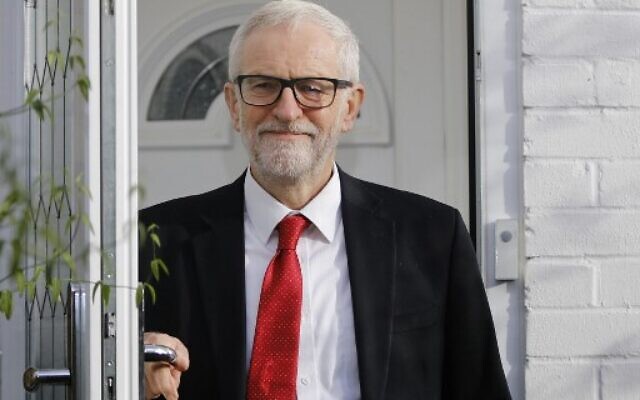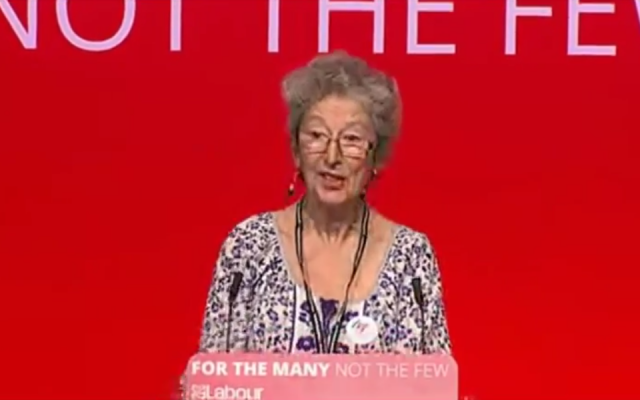After backlash for exposing UK Labour antisemitism, how John Ware won back his name
Following his 2019 segment on BBC’s ‘Panorama,’ veteran journalist has gone to court to prevent Jeremy Corbyn’s supporters from sweeping their party’s problems under the rug
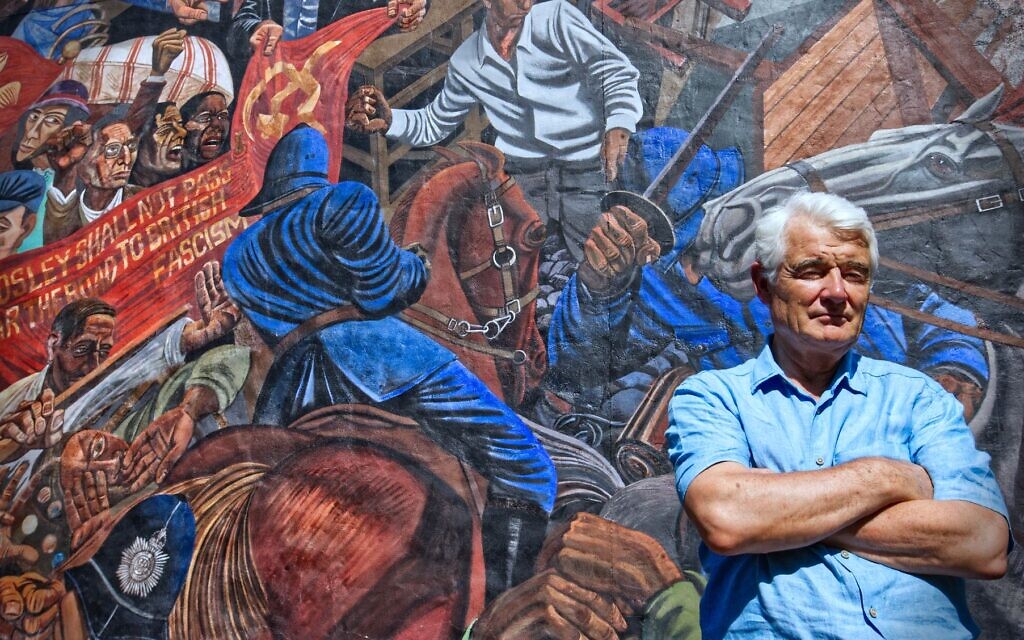
LONDON — On the evening of July 10, 2019, the BBC’s flagship current affairs program, “Panorama,” aired a devastating expose of the scale of antisemitism in Britain’s Labour party.
Nearly four years on, its fallout continues to reverberate around the program’s presenter, veteran journalist John Ware, even as former Labour head Jeremy Corbyn was formally banned last week from running as a candidate of the party in the next elections.
“It’s dominated my life,” Ware tells The Times of Israel in an interview.
The antisemitism scandal which rocked the UK’s principal opposition party began to draw to a close three years ago on April 4, 2020, when Keir Starmer was elected to succeed the hard-left former leader, Corbyn.
But, for Ware, that moment came at the outset of a series of legal battles — including an unprecedented libel case by Ware against the Labour party itself — to clear his name following a deluge of attacks on his journalistic ethics and motivations.
Those battles — which culminated late last year — saw the journalist accused of deliberately attempting to blacken Corbyn’s name and having far-right associations, as well as suggestions that Ware’s Jewish wife and family affected his objectivity.
Undermining “Panorama,” believes Ware, has rested at the heart of a continuing attempt by some of the former Labour leader’s supporters to rewrite the history of the Corbyn years and pin the blame for the party’s catastrophic defeat in December 2019 at the door of the public service broadcaster.
Ware began work on the program four months before it was broadcast. By that point, accusations of antisemitism in the Labour party had regularly featured in the media for at least three years. The core point of the dispute between Corbyn’s supporters and opponents was the question of scale: the Labour leadership believed the problem had been inflated by its critics for political ends. Corbyn himself continues to stick to that line — a position which has seen him kicked out of the parliamentary party and deprived of the opportunity to run with Labour in the next general election, which is scheduled to be held no later than January 28, 2025.
Ware says he became convinced that antisemitism in the party wasn’t simply a marginal issue confined to its fringes after reviewing 700 pages of documents, including statements, letters and local constituency party motions.
The BBC gave the green light for the program to proceed when a number of current and former Labour party staff based in the governance and legal unit, a disciplinary outfit responsible for investigating allegations of antisemitism, agreed to speak out on the record. Ware says he found the seven whistleblowers — most of them young, relatively junior employees and only one of whom was Jewish — “personally compelling.”
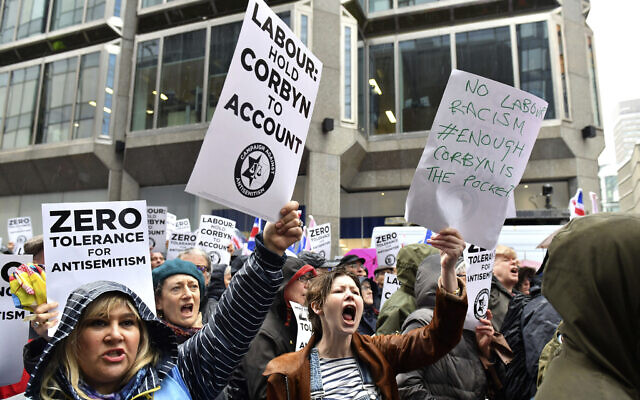
“They described a really horrible atmosphere of toxicity and unpleasantness,” he recalls. And while they weren’t experts in antisemitism — unsurprisingly, because Jew-hate hadn’t been an issue in the center-left party until Corbyn’s election as leader in 2015 — Ware says they were “very decent people who didn’t like what they saw.”
He recognizes too that their decision to come forward had not been easy. Such was the atmosphere in the party by this time that Luciana Berger, a prominent Jewish MP who had campaigned against antisemitism, had required police protection at Labour’s annual conference the previous autumn.
“I thought they were brave; they’ve had a lot of flack,” Ware says.
I thought they were brave; they’ve had a lot of flack
The whistleblowers’ powerful testimony that their efforts to root out antisemites had been undermined by senior Labour figures who repeatedly interfered with the party’s complaints procedures — rested at the heart of the program and ignited a political firestorm.
Shortly before the program went on air, the Labour party launched a full-frontal attack on Ware, issuing a statement to the media accusing him of “deliberate and malicious misrepresentations designed to mislead the public.” The party staff who had participated had “political axes to grind” and were motivated by opposition to Corbyn, Labour also claimed.
In his 40 years as a broadcaster, Ware has reported on a wide range of contentious topics. He’s tracked down Nazi war criminals in South America, investigated allegations of a “dirty war” by British forces in Northern Ireland, and exposed abuses of human rights in Saudi Arabia.
He fully expected Labour to be critical of the program. He was nonetheless shocked by the party’s response.
“I was absolutely knocked sideways. The Labour party was the aspirant government,” he says. Critics were entitled, Ware says, to say it was “a lousy program or terrible journalism,” but he refused to allow claims that he had deliberately misled viewers to go unchallenged.
I was absolutely knocked sideways. The Labour party was the aspirant government
“If you follow the logic it means not just me, but my colleagues, and the legal department and the editorial chain of command, some or all of us sat around and colluded. Whatever people may think about the BBC, that doesn’t happen,” he says.
Labour’s attack was, however, simply the opening salvo. On BBC radio, Naomi Wimborne-Idrissi of the Jewish Voice for Labour (JVL) — a pro-Corbyn group that believes allegations of antisemitism in the party are designed to silence criticism of Israel — falsely claimed Ware’s journalism had included “right-wing, racist work” and that he had “engaged in Islamophobia and extreme, far-right politics.”
Ware was also accused by the Press Gang website of being a “rogue journalist” who had “engaged in dirty tricks aimed at harming the Labour Party’s chances of winning the General Election.” “Panorama,” it charged, had shown a “knowingly false presentation of the extent and nature of antisemitism within the party, deliberately ignoring contrary evidence.”

Press Gang’s allegations against Ware were also published in a glossy pamphlet that was delivered to 100 senior BBC staff, as well as a further 200 journalists at national newspapers and broadcasters. Flyers attacking “Panorama” were also handed out to employees outside the BBC’s Broadcasting House in central London.
Ware describes the allegation that his work on “Panorama” was motivated by political bias and a desire to stop Corbyn from entering Downing Street as “ludicrous [and] infantile.”
“Three weeks before the election,” he says, “I’d also made a program about Boris Johnson and written a script that said, in terms, the prime minister has got a tenuous relationship to the truth and what’s more I had a witness to show that — his former American mistress.”
The program has acquired a “totemic” status in the eyes of some on the hard-left
And he dismisses suggestions that the program had a “key role” in Labour’s defeat.
“Being as dispassionate as I can, I think it’s fair to say there were quite a number of other deficiencies in Mr. Corbyn’s box that might well have explained his defeat other than one ‘Panorama’ transmitted six months before the election to slightly under 2 million people,” Ware says.
Nonetheless, he believes that, while many of the other issues it covered — such as Corbyn’s association with various antisemites — were already known, the program has acquired a “totemic” status in the eyes of some on the hard-left.
“They felt that, if you can destroy this, you can rewrite history and rehabilitate [Corbyn’s] reputation which was unfairly damaged, with Britain being deprived of its first pro-Palestinian prime minister,” Ware says.

But rather than allow his own professional reputation to be traduced and the truth about antisemitism on Corbyn’s watch to be muddied, Ware decided to fight back.
His first defamation action — against the Labour party — was settled soon after Starmer became leader. Labour apologized “unreservedly” for the statements it had made about Ware and the whistleblowers at the time the program aired and agreed to pay out substantial damages. Ware’s lawyer believes that although journalists have taken individual politicians who have libeled them to court in the past, it was unprecedented for a political party to have faced such a claim.
I’ve been nowhere near the far right. They are disgusting individuals, loathsome
Ware describes his reaction to the false claims that he had engaged in extreme far-right and racist politics as one of “fury.” He decided to sue JVL.
“I’ve made programs about the far right,” he says. “As it happens, I think I’ve only voted Conservative once in my life. I’ve voted for parties to the left of that. I’ve been nowhere near the far right. They are disgusting individuals, loathsome.”
Once again, he emerged victorious. Wimborne-Idrissi and JVL unreservedly apologized and admitted the allegations — which they had taken from his Wikipedia profile which had been maliciously edited two or three days before the program aired — against him were untrue.
Finally, last November, Ware won damages at London’s High Court against Press Gang’s publisher, Paddy French.
He rejects the notion that, by taking legal action against the website, he breached the convention that journalists don’t sue other journalists.
“I didn’t hesitate, hardly,” he responds. “I think most of my colleagues understand the world has changed dramatically. It’s open season on social media now. You can either turn a cheek or you do something about it and I thought: I’m not having this.”
It’s open season on social media now. You can either turn a cheek or you do something about it and I thought: I’m not having this
The judge, who described Ware’s case as “overwhelming” in his ruling, singled out the “particularly distasteful” claims about the journalist’s family being Jewish. “No credible or reputable journalist could possibly have thought that the claimant’s family’s faith had any relevance to the accuracy, or otherwise, of the program,” he wrote. “The defendant may have thought the claimant and the program were legitimate targets for criticism; on no view could he reasonably have thought that the claimant’s family was.”
As Ware points out, his legal cases are among around two dozen arising from the Corbyn years — the majority of which involve defamation and antisemitism. So far, the Corbynites are on a losing streak, with bills running to an estimated £5.6 million ($6.9 million).
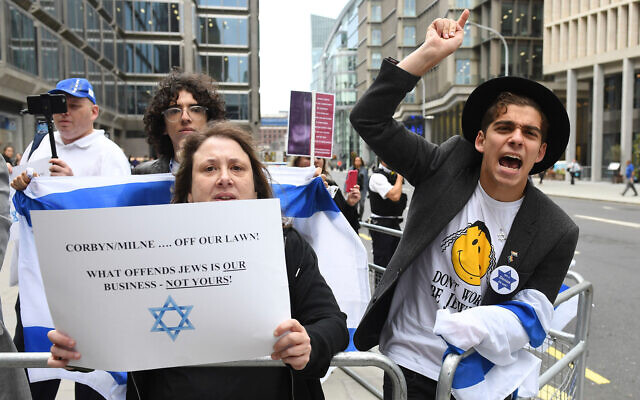
Ware believes the ongoing anger the “Panorama” program provoked in some hard left circles points to wider issues surrounding how claims of antisemitism are treated and the challenges of reporting them to the public. At their heart, he says, is the fierce battle about where anti-Zionism bleeds into antisemitism.
Ware himself is growing tired of endlessly responding to those who continue to attempt to undermine the credibility of the program.
“There comes a point with your opponents when it’s pretty much pointless carrying on arguing because they don’t seem to see reason,” he says. “I’m pretty close to that point. It’s not healthy to be down this rabbit hole for so long.”
But making the program, and its prolonged aftermath, have also taught him that Britain has a “really crap debate about bigotry.”
“We find it terribly difficult to debate and discuss these issues without name-calling, attributing malign motives and just being generally disagreeable, unpleasant, rigid and dogmatic, not open-minded, resistant to evidence,” Ware says. “It’s just a very sad spectacle.”
There's no paywall on The Times of Israel, but the journalism we do is costly. As an independent news organization, we are in no way influenced by political or business interests. We rely on readers like you to support our fact-based coverage of Israel and the Jewish world. If you appreciate the integrity of this type of journalism, please join the ToI Community.

We’re really pleased that you’ve read X Times of Israel articles in the past month.
That’s why we started the Times of Israel eleven years ago - to provide discerning readers like you with must-read coverage of Israel and the Jewish world.
So now we have a request. Unlike other news outlets, we haven’t put up a paywall. But as the journalism we do is costly, we invite readers for whom The Times of Israel has become important to help support our work by joining The Times of Israel Community.
For as little as $6 a month you can help support our quality journalism while enjoying The Times of Israel AD-FREE, as well as accessing exclusive content available only to Times of Israel Community members.
Thank you,
David Horovitz, Founding Editor of The Times of Israel


